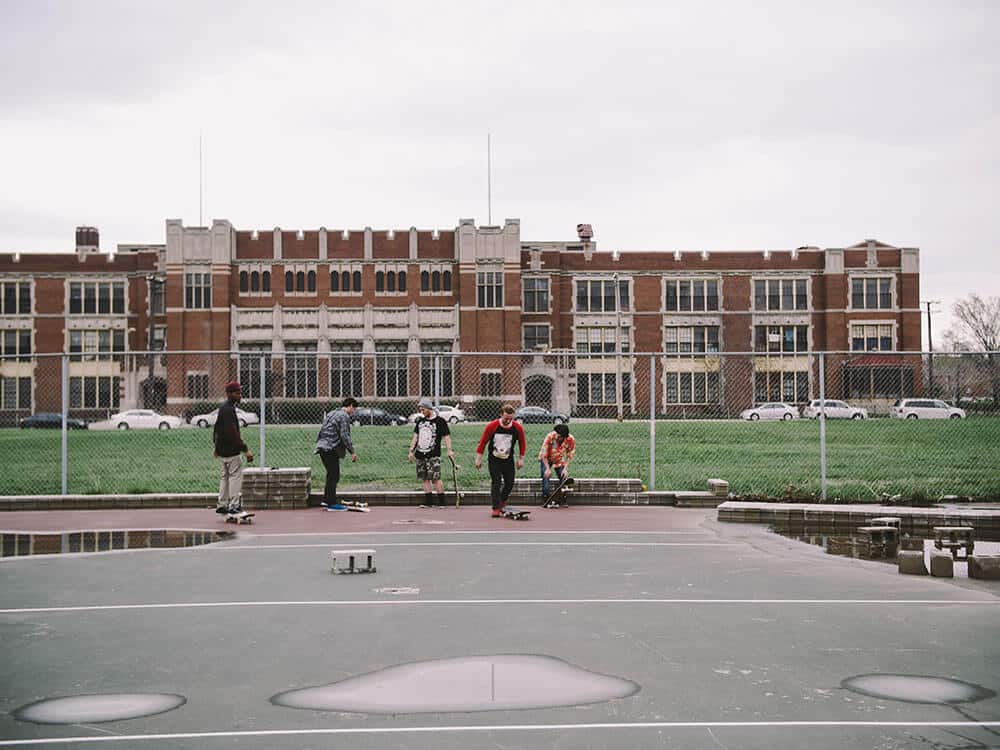Do you remember the first friend you made?
The first person I consciously remember calling my “friend” (and later, “best friend”) was someone I met in preschool. I was probably four years old. We had similar interests, and complementary personalities (he was the big picture idea guy, I was the detail-oriented do-er).
As I’ve continued through life, my friendships have shifted. I’ve made new friends along the way, deepened my relationship with existing friends, and fallen out of touch with others. When you look at it this way, it seems like friendship is something that just “happens.” You can’t control it, it would seem, and maybe it’s better not to. After all, you can’t force friendship.
Yet, what I’ve come to realize in the past couple years is that while you can’t force or manufacture friendship, you can seek and cultivate it. It isn’t completely out of your control. In fact, since it’s such an important part of living a happy life, it’s something that you put on autopilot at your peril.
“Friendship is born at that moment when one person says to another, ‘What! You too? I thought I was the only one.”
– C.S. Lewis
One of the best things about college is all the opportunities it gives you to start fresh. This is especially the case with friends. You’re in a new place surrounded by literally thousands of people you’ve never met before. All of these people are potential friends. You just have to seek them out.
Which can be overwhelming.

That’s why I put this article together. I want to help you turn your feeling of overwhelm into a feeling of opportunity and excitement. Excitement at the insane number of opportunities you have to make new friends while in college. Whether it’s your first semester or your final semester, this article will show you how to make new friends and deepen existing friendships in college and beyond.
Let’s get friendly!
No longer in college? Learn how to make friends as an adult.
Why You Have the Friends You Do

Where did you make your first friends? For most people, the answer fits into one of two categories:
- Your school
- Your neighborhood
What do these two areas have in common? They’re where you spent most of your time as a kid. So the reason you had the friends you had was quite simply that you spent lots of time repeatedly interacting with them.
Now, there are some important caveats. I’m not saying that geography determines all. Shared interests and personality play a very important role as well. You were obviously drawn more to some people than others. Perhaps you admired how outgoing the other person was, while they were drawn to your calmness. Perhaps you both liked trading Pokémon cards, or both preferred recess over story time.

Still, the influence of where you spent the most time and whom you spent it with is strong.
This continues later in life, too. My best friends from high school were people that I knew from the following places:
- Marching band
- Honors classes
- Theater
- Often two of the above, or in some cases all three (!)
Once more, the key factor was spending lots of time together doing shared activities, activities that reflected at least some sort of shared interest or value. People join marching band for lots of different reasons, for instance, but most of them are bound to share at least a couple of those reasons in common.
This information can tell us a lot about how to actively make friends, and that’s what we’ll cover next.
How to Make Friends with Intention
“If you go looking for a friend, you’re going to find they’re very scarce. If you go out to be a friend, you’ll find them everywhere.”
– Zig Ziglar
Now that we’ve covered why we have the friends we do, let’s go out and find some. I know this may seem kind of weird. After all, friendship is one of those things society tells us should just happen naturally. Actively seeking friendship can seem unnatural.
I think, however, that being intentional about your relationships is one of the keys to a happy life. Unlike your family, you have control over who your friends are. It makes sense, then, to be deliberate in choosing friends. Actively seeking out friends means you’re more likely to have people around you who energize you, make you laugh, and support you during difficult times.
Now that we’ve established the importance of being intentional about who your friends are, we can move on to the how part. I’ve broken this next part into three sections to make it easier to navigate and review later.
So let’s get to the first part: where to find friends.
Part 1: 9 Places to Find Friends in College
“You can make more friends in two months by becoming interested in other people than you can in two years by trying to get other people interested in you.”
– Dale Carnegie
Something that I’ve struggled with in the past is where exactly I should go to meet potential friends. This might seem obvious to some people. But if you’re an introvert like me, it can be helpful to have a defined list of places, as it takes some of the mystery and worry out of potential interactions.
Even if you’re a very social person, you may not have realized all the possible places that you can go to meet people in college. It’s pretty ridiculous when you think about it, especially if you go to a larger school.
So here are nine places to find friends in college. This isn’t a complete list, but it’s a great place to get started. If you think of other places I missed, please share them in the comments.
1. Campus Events
Thomas is fond of saying that college is a lot like a four year TED or SXSW conference. Nowhere is this clearer than in campus events. Here are just a few of the types of events that were common at my college:
- Guest speakers
- Karaoke nights
- Protests
- Charity 5Ks
- Free craft nights
- Classical music concerts
- Music festivals
- TEDx
- Quidditch matches
- Themed dances (with free food!)
- Global Nomad socials
Campus events are a great place to meet people. They give you an automatic talking point (especially if it’s something like a speaker), and they run the gamut of comfort levels for introverts and extroverts.
Facebook has made it easier than ever to learn about these events. What’s more, you can always check out the dozens of posters advertising them around campus. The real challenge is choosing which ones to go to, as there’s likely something every night of the week.
Bonus Tip: Many events (especially those with guest speakers) have a reception before or after. These are great places to strike up a conversation.
2. Campus Organizations
Campus organizations might be the best place to make friends. This is simply because there are so many of them. Whether it’s an intramural sport, a social cause, a recreational activity, a musical pursuit, or a career aspiration, there’s probably a club for it.
Clubs have all the benefits of campus events with the added bonus that they meet regularly. This gives you a chance to have repeated interactions with the same people, which is an important ingredient in forming friendships.
Caveat: Pick your campus organizations carefully. It’s fine to try out a bunch of different clubs at the beginning of the semester, but it’s better in the long run for both your social life and your stress levels to commit to 2-3 clubs that you really enjoy and care about.

It’s also worth noting that some clubs are better for forming friendships than others. Clubs that are highly structured, such as a musical group or campus council, often leave little room to actually talk and get to know each other.
That’s not to say you shouldn’t join more structured clubs (I was in several musical groups throughout college), but it can make it a little trickier to make friends than less structured organizations such as a philosophy discussion group or a running club.
3. Classes
There are 168 hours in a week. Assuming that you spend 8 hours a night getting excellent sleep, that leaves you with 112 waking hours. You probably spend around 12-15 hours in class each week, which works out to 10.71% – 13.39% of the time you’re awake. This represents a great opportunity to make friends.
As with clubs, some classes work better than others for making friends. Classes that have labs or group projects, annoying as they may be, tend to work better since they give you more time to talk than a class that’s just straight up lecture.
Classes also enjoy the obvious benefit of some sort of shared interest (or at least shared obligation, if it’s a gen ed/required class).
4. Your Dorm
If you’re not in class, then odds are you’re in your dorm. Especially if it’s your first year of college. The food may be gross, and the decor may look like it was lifted from Doom, but one thing dorms do have going for them is that they’re a great place to make friends. Even if it’s just bonding over shared adversity.
Seriously, though, dorms are great because of all the spontaneous social interaction they invite. Whether it’s hanging out in the common area doing homework, brushing your teeth in the community bathroom, or staging an impromptu hallway Nerf battle at 2 am on a Tuesday, it’s a fertile ground for friendships to develop.
Of course, the above also applies in other living situations. Sharing a house with semi-random people was where I made some of my best friends in college. Even if you’re renting an apartment off campus, you can still make an effort to get to know your neighbors.
5. Informal Hangouts
This is a pretty broad category, including everything from big house parties to dorm lounge smash tournaments. Often these begin with a casual text like, “Hey, we should all hang out tonight.” Where things go from there is anyone’s guess.
What’s great about informal hangouts is that they allow for lots of time to actually talk and get to know people. (Okay, this may not be true if it’s a wall-to-wall frat party blaring Kanye, but you get the idea).
They’re also, well, informal, so if things get awkward it’s easy to just leave. These sorts of hangouts are also great for cultivating existing friendships (more on that below).
6. Around Campus
People often overlook this, but if you keep an open mind you can meet some really cool people this way.
Basically, this is everywhere that’s not class. Some examples include:
- The gym (if you’re both working out, then that’s clearly a shared interest).
- The student center (great for people watching, but also a nice place to strike up casual conversations)
- Waiting in the hall (whether it’s before class or a meeting with a professor or whatever)
- Walking around campus (obviously don’t be creepy, but if you happen to be walking the same way as someone or to the same location, that’s a nice conversation starter)
This is probably on the more “advanced” level of making friends, as it requires you to initiate conversations with strangers. But it’s a great way to overcome shyness and increase your confidence.
7. Online
This can take different forms, but the most obvious is any Facebook groups associated with your class or school. I didn’t do this a ton myself, but I knew people who made friends just through being active in the class Facebook group before the semester even started.
This is a great way to go if, like me, you come across more eloquently in writing than you do in person.
Just don’t be one of those people who spams the group–not cool.
8. Internships and Research Assistantships

We’re big fans of internships here at College Info Geek. Not only do they look great on resumes and give you real work experience to talk about in job interviews, but they’re also a superb way to make friends.
For example, when I spent seven weeks living on campus as a summer research assistant, I had the chance to make several new friends. The campus was nearly empty, and that made it feel a lot more manageable. I lived in a dorm with maybe 200 other students, and I ran into a lot of the same people while cooking dinner or doing laundry.
Once again, this sort of experience provides a great common ground for conversations. Even things as simple as, “So what sort of research are you doing this summer?” or “How did you find this internship?” can be the openings of meaningful relationships.
9. Campus Jobs
In the “professional world,” people often talk about having “work friends.” But this isn’t something that requires you to have a full-time job to take advantage of. Besides the time management and obvious monetary benefits, campus jobs are a cool way to meet people.
When I worked in the campus post office, for instance, I had the chance to chat with the same several people six days a week. I’ll admit I didn’t use this opportunity as well as I could have, but looking back it was an excellent place to meet people. This is an even better strategy if it’s a job with a lot of downtime such as working reception.
Having trouble remembering the names of all the new people you’re meeting? This guide will help.
Part 2: How to Go from Acquaintance to Friend
“Ultimately the bond of all companionship, whether in marriage or in friendship, is conversation.”
– Oscar Wilde
So you’ve gone out to some of the places above, and you’ve met some people. Ideally, you’ve chosen a place where you can encounter some of the same people over and over in order to build rapport. Maybe you’ve even exchanged phone numbers or added each other on Facebook.
Now that you have these “weak ties” (to use a term from sociologist Mark S. Granovetter), how do you take the relationship to a deeper level? How do you go from acquaintance to friend?
The answer, it turns out, is simple. Not necessarily easy, but definitely simple. What’s the “secret”? One-on-one time.
Hanging out in a group is lots of fun, but it can be difficult to spend enough time talking with one person to really open up to each other and get beyond surface level conversation. The best way to go from acquaintance to friend is to spend quality time talking and/or doing an activity together.

To make this easier, I suggest that you focus on cultivating one or two relationships at a time. Going out and meeting lots of people is a good idea to keep your social skills honed and broaden your network, but when it comes to making friends it’s best to keep it small. Especially if you’re more introverted and find social interactions draining.
Like dating, it’s also best to keep things casual at first. Message the person and suggest meeting for coffee or (cheap) lunch. These settings are great because they’re low pressure and allow for easy escape if the conversation gets stale.
Or if you want more structure, then suggest an activity you both would enjoy, ideally one that’s not too intense. That is, going for a walk in a local park is probably better than suggesting the two of you hike the Appalachian Trail.
Tip: Pick an activity where you can actually talk to each other. So eating a meal together is better than seeing a movie, for example.
If things are going well, then you may be ready to take things to the “next level,” which we’ll cover in the following section.
Part 3: How to Deepen and Cultivate Friendships
“A friend is a person with whom I may be sincere.”
– Ralph Waldo Emerson
Let’s say that you’ve gone through Part 2, and you now would definitely call yourselves friends. How do you maintain this friendship, and how do you take it to a deeper place?
Maintaining the friendship is similar to the above section. Just keep in touch and do things together regularly. Pretty simple (though it can take some effort, especially when your life gets busy).
As for deepening a friendship, the key in my experience (and from people who are far more qualified), is vulnerability.
This video from The School of Life sums up the concept nicely:
When people complain about “shallow” conversation, they’re usually getting at a deeper lack of vulnerability. They’re getting at, as the video explains, people trying to seem impressive instead of revealing what they’re really like, how they really feel.
Vulnerability isn’t easy. As Brené Brown puts in her TED talk “The Power of Vulnerability”:
“…in order for connection to happen, we have to allow ourselves to be seen, really seen.”
This can be painful. And risky. But also tremendously rewarding. Have a look at this article for some practical ways to be more vulnerable.
Bonus Round: Common Questions and Miscellaneous Tips
“Life is partly what we make it, and partly what it is made by the friends we choose.”
– Tennessee Williams
Before we wrap up, I want to address a couple common questions students have about friendship, as well as include some miscellaneous advice that didn’t fit elsewhere in the article.
1. How do I stay in touch with my friends from high school when I’m in college?
This is a tricky one, and it depends on your circumstances. If you go to college in the town where most of your high school friends still live, it’s just a matter of meeting regularly.
If, however, you and your friends are scattered all across the country at different colleges, as it was for me, then you have to be more deliberate. My high school friends and I have always made a point of getting together during breaks to go to trivia, have parties, and even take summer road trips. And, of course, text, call, and FaceTime regularly.

That being said, you should also expect that you’ll drift apart from some of your high school friends. People change a lot after high school. The gap between “life stages” widens, or is at least more visible than it was before college. This can be uncomfortable, but it’s bound to happen.
On the other hand, if you were unsatisfied with the friendships you had in high school, college is a great place to start fresh. Obviously don’t be a jerk, but don’t feel like you have an obligation to remain friends with people just because you hung out with them in high school. That’s the sunk cost fallacy at work.
2. None of my friends ever want to do anything. What should I do?
This one’s simple: Become the organizer. Take an active role in planning things for all of you to do. It took me far too much of college to realize the power of this approach.
Because generally it’s not that your friends don’t want to hang out. They’re just in the same position as you, looking for someone to nudge them toward an activity. Don’t be part of the inertia; be the one who moves things along.
3. Advice: Branch out from your initial friend group
Coming into college, it’s normal to make friends with the first people you meet and click with. There’s nothing wrong with this (I’m still friends with some people I met at my college orientation).
But I would encourage you not to feel like those people are the only ones you can ever be friends with. Go to some of the places I suggested above and try to branch out. Join a new club, take a class that’s outside your area of expertise, or strike up a conversation with a coworker.
The result is likely to be a richer life and an expanded social circle.
Get Out and Make Some Friends
“Each friend represents a world in us, a world possibly not born until they arrive, and it is only by this meeting that a new world is born.”
– Anaïs Nin
This article covered a lot of ground. As with any kind of advice, however, it’s useless if you don’t apply it. At the end of the day, the best advice I can give for making friends is to make it a priority. Once you’ve achieved that mindset shift, your job is to get out there and make it happen.
So today, I’d like to challenge you to apply just one piece of advice from this article. Try looking in a new place for friends. Invite an acquaintance out for coffee. Practice vulnerability with an existing friend.
If you take even one of these steps, you’ll be on your way to a happier, more fulfilling life.
Image Credits: header image, blurry crowd, swing set, story time, jazz, research, get coffee, skaters


